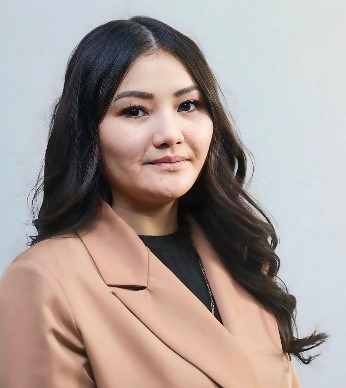
Competition name: Grant funding for the research of young scientists under the “Zhas Galim” project for 2025-2027 years.
Project Manager: Madina Zh. Bazarova.
Identifiers:
- ResearcherID Web of Science: N-9474-2017,
- ORCID: https://orcid.org/0000-0002-2117-5390,
- Scopus Author ID: 56512350900
Project Research Team
| № | Full name | Project position | Identifiers (Scopus Author ID, Researcher ID, ORCID, if any) and links to related profiles |
|---|---|---|---|
|
1. |
Indira M. Uvalieva |
Scientific consultant |
ResearcherID Web of Science: N-9474-2017, |
Project abstract
In recent years, Kazakhstan has been actively reforming the educational system, which is associated with the introduction of new government programs, such as "Digital Kazakhstan", "State Program for the Development of Education for 2022-2025", "Concepts of digital transformation, development of the information and communication technologies and cybersecurity industry for 2023-2029", "Development Concept artificial Intelligence for 2024-2029", the Law "On the status of a teacher", the concept of the Bologna process, "Atlas of new Professions and competencies", Professional Standards of the Republic of Kazakhstan. These programs and standards emphasize the need to update the content of education and improve the skills of teachers, as higher education institutions are assigned the role of centers of "education, science, creativity and knowledge transfer." Kazakhstan supports the concept of a market-oriented innovative university based on three key components: education, science and innovation. The Government aims to invest in human resources, develop professional skills and conduct scientific research. Modernizing the educational system to meet the needs of a knowledge-driven global economy is also a priority. These priorities include meeting the modern challenges of the 21st century, the requirements of an innovative economy, and the needs of society and individual citizens. One of the key areas of modern education is the development of a personality capable of adapting to a changing world, becoming competitive and unique. It is important to form a creative personality who can independently update his knowledge, extract useful information and realize his goals and values. For this purpose, active use of cognitive research activities in key academic fields such as science, mathematics, technology and engineering is recommended.
The relevance of the study of ontological modeling of the process of teacher training with elements of STEM education is due to several factors. Firstly, attention to STEM disciplines (science, technology, engineering, mathematics) is growing, as they are critical for innovation and economics. Secondly, the development of ICT leads to new methods and models of learning. Thirdly, an ontological model for teacher training can simplify the creation and implementation of personalized educational programs.
The aim of this project is to develop an adaptive ontological model of the teacher training process that integrates STEM methods and modern digital technologies to improve the effectiveness of training specialists who meet modern labor market requirements.
Expected and achieved results of the project:
| Year |
The results obtained from the research. |
|---|---|
|
2025 |
Studying the world experience in the field of STEM approach and ontological engineering in the process of intensification of teachers' competencies. Analyze the processes of teacher training and select tools for building an ontological model. |
| 2026 |
Identify key STEM methods that can be effectively integrated into the teacher training process. Development of an information model of the ontological knowledge base of the teacher training process with elements of STEM education. |
| 2027 |
Development of an adaptive ontological model of the teacher training process using elements of STEM education. Development and testing of a pilot project of a digital platform for supporting an ontological model of the teacher training process, integrating STEM methods and modern digital technologies. |
Infographics
Date of last changes:13.01.2026



